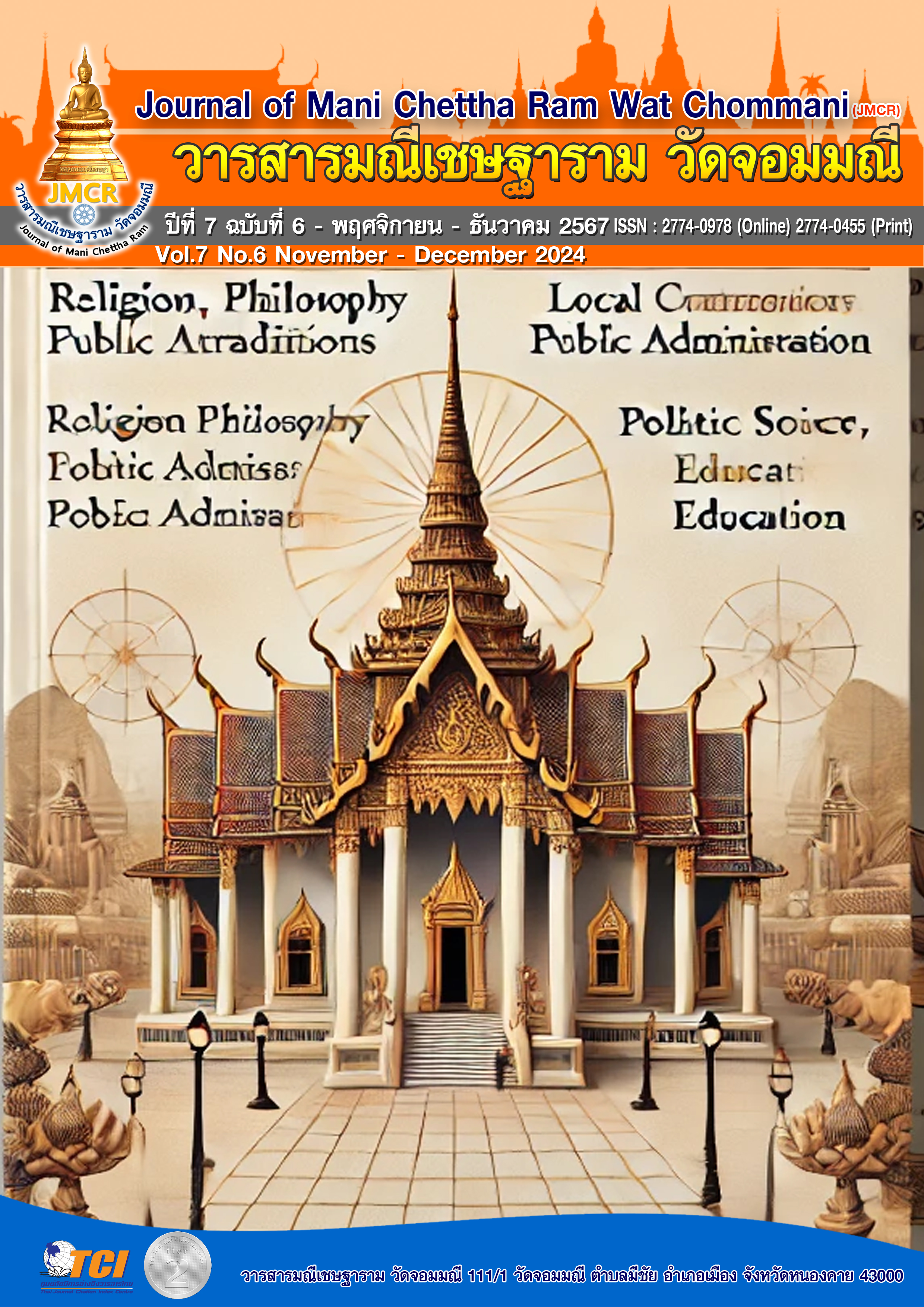SCHOOL MANAGEMENT TO STRENGTHEN STUDENT LEARNING IN EDUCATIONAL INSTITUTIONS AFFILIATED TO THE SA KAEO PRIMARY EDUCATION AREA OFFICE. DISTRICT 1
Keywords:
School administration, Learning enhancement, Stakeholder participationAbstract
This study aimed to explore: 1) the current state of strengthening student learning, 2) best practices in enhancing student learning, and 3) guidelines for school administration to foster stronger student learning in schools within this area. The sample included 306 teachers, along with 19 key informants from schools within and outside the study area. Data collection tools comprised questionnaires and interviews, with data analyzed using descriptive statistics and content analysis.
The findings revealed that: 1) the overall state of strengthening student learning was at a low level. Key strengths included promoting positive learning attitudes, well-being, and technology use, while the weakest area was teacher empowerment. 2) Best practices involved integrating proactive learning processes, empowering teachers through knowledge exchange, creating diverse learning activities, providing quality technological resources, and fostering systematic participation from stakeholders. 3) Key administrative guidelines included planning appropriate proactive learning processes, developing teachers with clear visions, creating supportive learning environments, utilizing technology in teaching and assessment, and establishing sustainable collaboration with stakeholders.
References
กัญญาณัฐ บุตรแสนโคตร. (2565). การพัฒนาความร่วมมือในชุมชนเพื่อส่งเสริมการศึกษา. ใน วิทยานิพนธ์ปริญญามหาบัณฑิต. มหาวิทยาลัยมหาสารคาม.
เจริญ ภูวิจิตร์. (2565). การพัฒนาทักษะการเรียนรู้ในยุค Next Normal. [เอกสารเผยแพร่]. กรุงเทพมหานคร: สถาบันพัฒนานวัตกรรมการเรียนรู้.
ประทุมทอง ไตรรัตน์. (2566). การบริหารสถานศึกษาที่มุ่งเน้นการพัฒนาสติปัญญาและอารมณ์. ใน วิทยานิพนธ์ปริญญามหาบัณฑิตไม่ได้ตีพิมพ์. มหาวิทยาลัยราชภัฏสวนสุนันทา.
วันนะเลด วละสุก. (2561). การเรียนรู้เชิงบูรณาการในบริบทชุมชน. Graduate Studies Journal, 15(68), 158–166.
สถาพร พฤฑฒิกุล. (2560). การเปลี่ยนแปลงระบบการศึกษาในยุคดิจิทัล. วารสารศึกษาศาสตร์ มหาวิทยาลัยบูรพา, 28(2), 1–14.
สำนักงานเขตพื้นที่การศึกษาประถมศึกษาสระแก้ว เขต 1. (2566). รายงานสถานภาพการจัดการศึกษาในเขตพื้นที่. กรุงเทพมหานคร: สำนักงานเขตพื้นที่การศึกษาประถมศึกษาสระแก้ว เขต 1.
สำนักงานเลขาธิการสภาการศึกษา. (2565). มาตรการฟื้นฟูภาวะถดถอยทางการเรียนรู้ (RECOVER). กรุงเทพมหานคร: สำนักงานเลขาธิการสภาการศึกษา.
Bush, T. (2003). Theories of educational leadership and management. Sage.
Evans, G. (2016). Understanding learning loss and educational inequality. Educational Review, 68(1), 1–12.
Fullan, M. (2007). The new meaning of educational change. Teachers College Press.
Griffin, P. (2011). Assessment for teaching. Cambridge University Press.
Hattie, J., & Timperley, H. (2007). The power of feedback. Review of Educational Research, 77(1), 81–112.
Hopkins, D., & Jackson, D. (2018). Leading school transformation. Routledge.
Hoy, W. K., & Miskel, C. G. (2001). Educational administration: Theory, research, and practice. McGraw-Hill.
Leithwood, K., Seashore Louis, K., Anderson, S., & Wahlstrom, K. (2004). How leadership influences student learning. Wallace Foundation.
Putnam, R. (2000). Bowling alone: The collapse and revival of American community. Simon & Schuster.
Rieckhoff, B. S. (2007). Teacher development in the digital era. Journal of Teacher Education, 58(3), 255–268.
UNESCO. (2023). Innovative approaches to learning recovery. UNESCO Publishing.
Vygotsky, L. S. (1978). Mind in society: The development of higher psychological processes. Harvard University Press.




